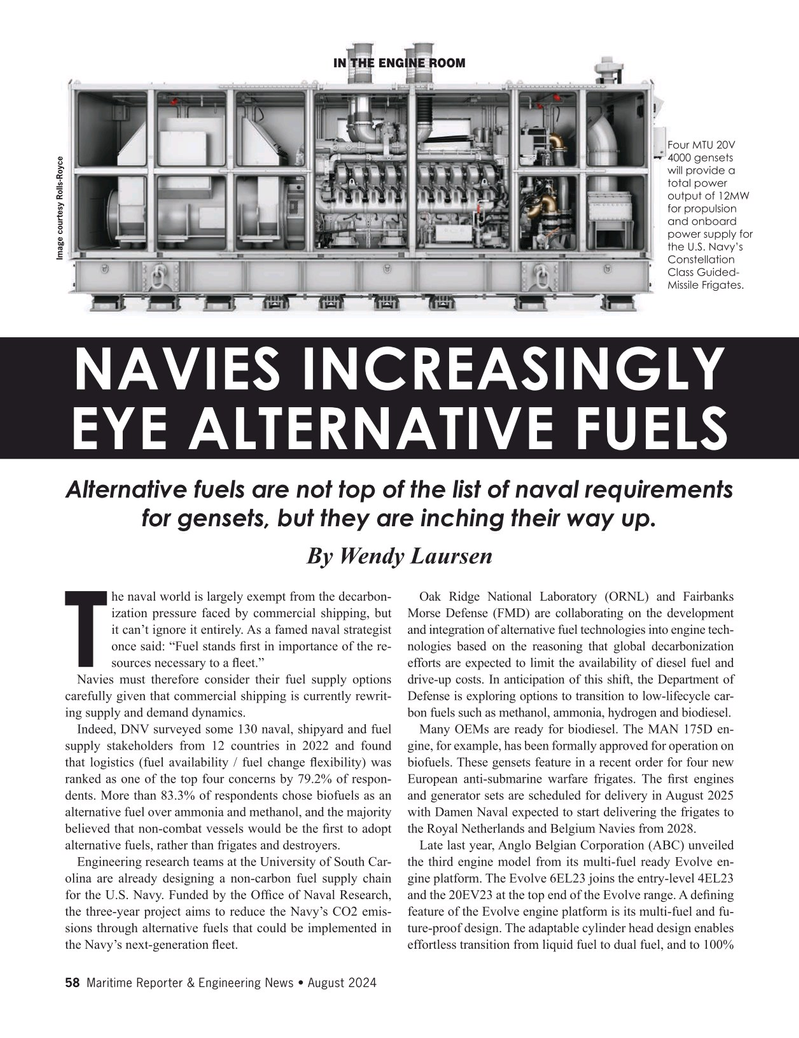
Page 58: of Maritime Reporter Magazine (August 2024)
Read this page in Pdf, Flash or Html5 edition of August 2024 Maritime Reporter Magazine
IN THE ENGINE ROOM
Four MTU 20V 4000 gensets will provide a total power output of 12MW for propulsion and onboard power supply for the U.S. Navy’s
Image courtesy Rolls-Royce
Constellation
Class Guided-
Missile Frigates.
NAVIES INCREASINGLY
EYE ALTERNATIVE FUELS
Alternative fuels are not top of the list of naval requirements for gensets, but they are inching their way up.
By Wendy Laursen he naval world is largely exempt from the decarbon- Oak Ridge National Laboratory (ORNL) and Fairbanks ization pressure faced by commercial shipping, but Morse Defense (FMD) are collaborating on the development it can’t ignore it entirely. As a famed naval strategist and integration of alternative fuel technologies into engine tech- once said: “Fuel stands ? rst in importance of the re- nologies based on the reasoning that global decarbonization
T sources necessary to a ? eet.” efforts are expected to limit the availability of diesel fuel and
Navies must therefore consider their fuel supply options drive-up costs. In anticipation of this shift, the Department of carefully given that commercial shipping is currently rewrit- Defense is exploring options to transition to low-lifecycle car- ing supply and demand dynamics. bon fuels such as methanol, ammonia, hydrogen and biodiesel.
Indeed, DNV surveyed some 130 naval, shipyard and fuel Many OEMs are ready for biodiesel. The MAN 175D en- supply stakeholders from 12 countries in 2022 and found gine, for example, has been formally approved for operation on that logistics (fuel availability / fuel change ? exibility) was biofuels. These gensets feature in a recent order for four new ranked as one of the top four concerns by 79.2% of respon- European anti-submarine warfare frigates. The ? rst engines dents. More than 83.3% of respondents chose biofuels as an and generator sets are scheduled for delivery in August 2025 alternative fuel over ammonia and methanol, and the majority with Damen Naval expected to start delivering the frigates to believed that non-combat vessels would be the ? rst to adopt the Royal Netherlands and Belgium Navies from 2028.
alternative fuels, rather than frigates and destroyers. Late last year, Anglo Belgian Corporation (ABC) unveiled
Engineering research teams at the University of South Car- the third engine model from its multi-fuel ready Evolve en- olina are already designing a non-carbon fuel supply chain gine platform. The Evolve 6EL23 joins the entry-level 4EL23 for the U.S. Navy. Funded by the Of? ce of Naval Research, and the 20EV23 at the top end of the Evolve range. A de? ning the three-year project aims to reduce the Navy’s CO2 emis- feature of the Evolve engine platform is its multi-fuel and fu- sions through alternative fuels that could be implemented in ture-proof design. The adaptable cylinder head design enables the Navy’s next-generation ? eet. effortless transition from liquid fuel to dual fuel, and to 100% 58 Maritime Reporter & Engineering News • August 2024
MR #8 (50-65).indd 58 8/8/2024 4:10:17 PM

 57
57

 59
59
